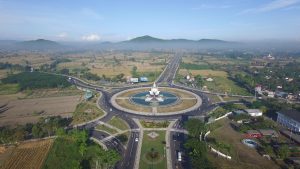Prior to CoST: Infrastructure in context
West Lombok is a regency of the Indonesian Province of West Nusa Tenggara. In 2020, Indonesia scored 37 out of 100 on Transparency International’s Corruption  Perceptions Index (CPI) and was ranked 102 out of 180 countries, up by five places since 2012. According to the Global Corruption Barometer, 92% of people think government corruption is a big problem in Indonesia. Meanwhile, 30% of public service users surveyed said they had paid a bribe in the last 12 months.
Perceptions Index (CPI) and was ranked 102 out of 180 countries, up by five places since 2012. According to the Global Corruption Barometer, 92% of people think government corruption is a big problem in Indonesia. Meanwhile, 30% of public service users surveyed said they had paid a bribe in the last 12 months.
As with many countries, infrastructure investment forms a key part of Indonesia’s development strategy. Projects such as Kertajati Airport – otherwise known as the ”crown jewel” of Indonesian public-private partnerships – serve as strong examples of cooperation between central government, provincial government and the private sector. However, historical obstacles to infrastructure delivery remain, including a lack of transparency throughout the project cycle and a lack of clarity in the regulatory framework for project delivery.
CoST West Lombok: How it all began
The West Lombok Regency applied for CoST membership as part of the 2019 CoST competitive process and its application was formally accepted in November of that year. The programme officially launched in July 2021. CoST West Lombok is hosted by the Road Transport and Traffic Forum (FLLAJ), a multi-stakeholder group comprising government and non-governmental members, which focusses on issues relating to road infrastructure and traffic. Prior to CoST, West Lombok had already made good progress in advancing the principles of transparency, multi-stakeholder working and social accountability through the Provincial Road Improvement and Maintenance pilot programme, in partnership with the Indonesia-Australia Infrastructure Partnership. CoST West Lombok will now use CoST principles to further build on this progress.
The four features of CoST
The CoST approach is focused on four core features: disclosure, assurance, multi-stakeholder working and social accountability. These features provide a global standard for CoST implementation in enhancing infrastructure transparency and accountability.
Disclosure in West Lombok
The disclosure process ensures that key information about the purpose, scope, costs and execution of infrastructure projects is open and accessible to the public, and that it is disclosed in a timely manner. Key to the disclosure process is the CoST Infrastructure Data Standard (CoST IDS). The CoST IDS requires 40 data points or ‘items’ to be disclosed at key stages of an infrastructure project cycle: identification, preparation, completion, procurement and implementation.
In July 2021, CoST West Lombok launched a brand-new infrastructure data portal called INTRAS, which discloses infrastructure data from across the regency according to the Open Contracting for Infrastructure Data Standard, and was built based on the award-winning SISOCS portal. With the launch of INTRAS, CoST West Lombok will now look to expand the types of infrastructure projects which the portal holds. The CoST core feature of assurance will now be particularly valuable in order to independently highlight the completeness and validity of information available, and develop recommendations for future works.
Legal mandate on disclosure
In Indonesia, the disclosure of infrastructure project data is required by Law no.14 of 2008. The law stipulates the obligation of public bodies to provide and serve requests for information in a quick, timely and simple manner. It is envisioned that CoST West Lombok can further strengthen Law no.14 by enhancing the quality of infrastructure project data, and increasing social accountability through the assurance process.
Multi-Stakeholder Working
CoST brings together stakeholder groups with different perspectives and backgrounds from across government, private sector, civil society and the media. Through each national programme’s multi-stakeholder group (MSG), these entities can guide the delivery of CoST and pursue infrastructure transparency and accountability within a neutral forum.
CoST West Lombok’s multi-stakeholder group (MSG) was established in early 2020, shortly after West Lombok joined CoST. Hosted by FLLAJ, CoST West Lombok’s MSG consist of 19 governmental members and 22 non-governmental members from the private sector, civil society and community and religious leaders. The Head of the Transportation Agency is the CoST champion.
Get in touch
CoST West Lombok
westlombok@infrastructuretransparency.org